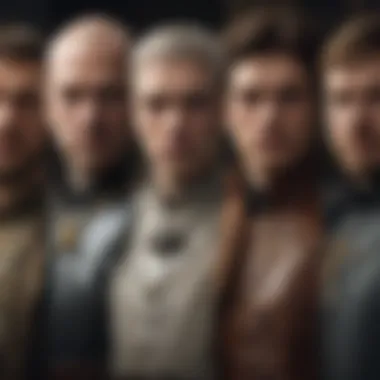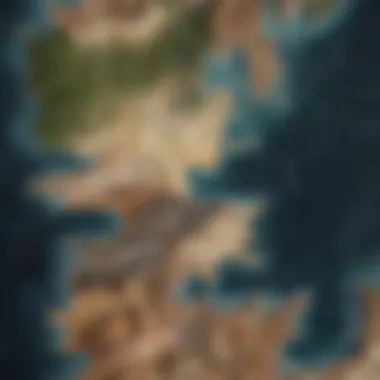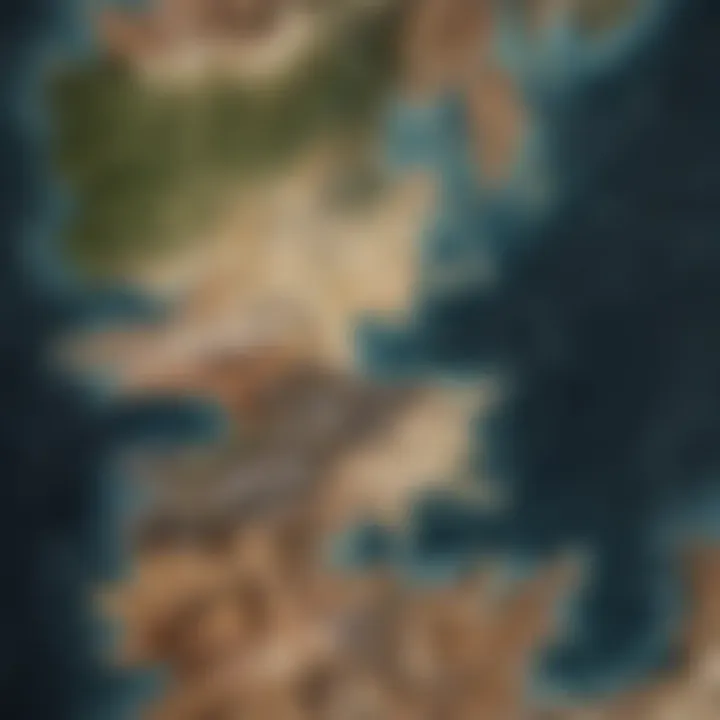The Four Kings: Power Dynamics in Game of Thrones


Intro
The intricate world of Game of Thrones weaves together complex stories of kings and power. In the center are four kings whose ambitions and reigns shape the fate of Westeros. This examination reveals their character motivations, leadership styles, and the significant implications of their choices on the story and its themes. The narrative, rich in betrayal and loyalty, showcases how power dynamic shifts affect both individual houses and the realm itself.
Character Dissections
Understanding the four kings requires a closer look at their characters. Each king manifests distinct traits and strategies in their quest for dominance.
Detailed Analysis of Key Characters in Game of Thrones
- Robb Stark – Known for his sense of honor and justice, Robb struggles to balance his familial obligations with the harsh realities of war. His decisions, while noble, often clash with the brutal tactics of other kings, leading to devastating outcomes.
- Joffrey Baratheon – Joffrey exemplifies the dangers of absolute power in immature hands. His cruelty and capriciousness create an atmosphere of fear in King's Landing, alienating potential allies and inciting rebellion.
- Stannis Baratheon – Stannis is a character marked by rigidity and a relentless pursuit of what he believes is rightful. His faith in Melisandre and the idea of destiny often blinds him to the necessity of adaptability in leadership.
- Renly Baratheon – Renly's charm and charisma attract followers, yet he often relies on spectacle rather than strategic depth. His hope for a peaceful reign contrasts sharply with the surrounding chaos.
Each of these kings reveals unique approaches to power, demonstrating the varied consequences of their reigns as they interact with the world around them.
Character Development Throughout the Series
The journey of each king reveals how power can either uplift or corrupt. Robb’s initially promising leadership shifts to tragedy when he is betrayed, illustrating how honor can be a double-edged sword. Joffrey’s descent into madness conveys how unchecked authority leads to chaos. Meanwhile, Stannis's commitment to his cause results in significant sacrifices, while Renly’s inability to fully engage with the harsh political landscape contributes to his downfall.
Impact on the Overarching Storyline
The actions of these kings directly impact the larger conflict in Westeros. Robb's assassination ignites deeper factions among the houses, Joffrey's reign breeds rebellion, while Stannis seeks to reclaim his family’s throne at any cost. Renly’s death creates a vacuum that allows others to vie for power, complicating alliances and conflicts. Their intertwined fates highlight the fragility of power and the relentless nature of ambition in Westeros.
"Power resides where men believe it resides. It's a trick, a shadow on the wall."
—Varys, the Spider
By exploring each character’s motivations and consequences, we gain insights into the broader themes of loyalty, betrayal, and ambition prevalent throughout the series. Their legacies become cautionary tales about the costs of power.
Episode Breakdowns
To understand the actions of these kings, it is essential to consider key episodes that highlight their struggles and triumphs in the pursuit of the throne. Each episode builds upon the character arcs and themes of power dynamics.
Recap of Significant Events in Each Episode
- Season 1, Episode 10 – The fallout from King Robert's death showcases the immediate power vacuum and sets the stage for the ensuing conflict.
- Season 2, Episode 5 – Stannis's resolve to take King's Landing is explored through his interactions with Melisandre, emphasizing his faith in destiny.
- Season 4, Episode 2 – Joffrey's wedding illustrates his tyrannical rule, while setting off a chain of events that leads to political upheaval in King's Landing.
Exploration of Themes and Symbolism
Recurring themes appear throughout these episodes, particularly the burden of leadership and the inherent conflict between personal desires and political obligations. Each character's journey reflects this struggle in different ways.
Key Moments and Their Implications
Moments such as Robb's betrayal at the Red Wedding or Joffrey's shocking demise serve as turning points that shift allegiances and redefine power dynamics among the houses. These critical incidents underscore the precarious nature of rulership in Westeros.
Lore Explorations
The rich history of Westeros lends context to the struggles faced by the kings in Game of Thrones. Understanding past events is crucial for grasping the stakes at play.
Delving into the Rich History and Lore of Westeros
Exploring lore reveals the layers of history that inform current events. Characters are often influenced by the legacy of their houses and the history of conflict.
Uncovering Hidden Details and Connections
Connections between characters, their houses, and previous kings create a narrative thread that enriches the story. For instance, the long-standing feud between the Starks and the Lannisters illustrates the cyclical nature of power struggles.
Exploring the Cultural and Mythical Aspects of the World
Cultural norms and myths shape the values and ambitions of the characters. The concept of the divine right of kings illustrates how belief systems affect the paths of these leaders.
Fan Theories
Fan theories surrounding these characters often offer fresh perspectives on motives and actions.
Compilation of Popular and Intriguing Fan Theories
One theory suggests that Joffrey’s lineage may not be as straightforward as assumed, which would have significant implications for claims to the Iron Throne. Others debate the true motivations behind Stannis’s unwavering determination to reclaim his throne.
Evaluation of Theories Based on Evidence from the Show
Many fan theories are supported by specific scenes or dialogue, providing alternate viewpoints on familiar narratives. This encourages the audience to engage deeply with the material.


Speculation on Future Plot Developments
As the endgame unfolds in the series, these theories also speculate about the possible rise or fall of these kings and their houses, questioning the ultimate fate of Westeros.
By analyzing these layers, we find a deeper understanding of the driving forces behind character actions and the overarching narrative. The four kings, through their complex journeys, underscore both the personal and political stakes in the realm of Game of Thrones, demonstrating how power and ambition can intertwine dramatically.
Prolusion to the Four Kings
In the realm of Westeros, kingship embodies power, legitimacy, and the often tumultuous struggles that accompany governance. The Four Kings, Robert, Joffrey, Tommen, and Stannis Baratheon, represent a spectrum of rulership styles, each reflecting various aspects of leadership, ambition, and consequence. This article endeavors to dissect the intricate dynamics between these figures, focusing on their motives and the fallout from their respective reigns.
Understanding the significance of each king allows for a deeper grasp of the overarching narrative of Game of Thrones. Their reigns not only shaped the fate of their houses but also significantly influenced the socio-political landscape of Westeros. This exploration aims to highlight how different leadership philosophies can yield contrasting outcomes in a society rife with conflict and betrayal.
The examination of these kings also sheds light on the broader themes prevalent within the series, including loyalty, morality, and the relentless pursuit of power. As the story unfolds, the paths taken by each monarch reveal critical lessons about governance, accountability, and the weight of legacy in a world where the throne is frequently contested.
Contextualizing Kingship in Westeros
Kingship in Westeros is a complex tapestry woven from history, tradition, and a constant drive for power. The Iron Throne, often regarded as the ultimate symbol of authority, is not merely a seat of power; it represents ambition intertwined with peril. A king's ascension to power is often marred by bloodshed, alliances, and betrayals.
Key elements that define kingship in this context include:
- Legitimacy: A ruler's claim to the throne is paramount. Questions of bloodline, honor, and conquest all factor into how legitimacy is perceived by the populace and other power players.
- Authority and Governance: How a king exerts authority varies significantly. Some rule through fear, while others rely on diplomacy and support. The methods employed can determine a king's longevity or swift downfall.
- Impact of War: Many kings must navigate the realities of war, both as aggressors and defenders. Military success or failure directly influences the stability of their reign.
- Cultural Significance: Kings are also enshrined within the cultural narrative of Westeros. Their tales, both heroic and tragic, are passed down through generations, shaping the identity of the realm.
Each of the Four Kings navigates these elements differently, leading to unique legacies. Their stories prompt contemplation on the nature of power and the responsibilities that come with it. As this article unfolds, we will dissect each king's approach to rulership, drawing parallels and distinctions that illuminate their impact on the saga of Westeros.
King Robert Baratheon: The Usurper King
Robert Baratheon’s reign in Game of Thrones is pivotal for understanding the power dynamics within Westeros. His position as the usurper king triggered a series of events that reshaped the Seven Kingdoms. His ascent to the Iron Throne and the nature of his rule would have lasting implications for his family, the noble houses, and the realm itself. Delving into Robert's background, rule, and legacy provides essential insights into the complexities of leadership and power in Westeros.
Background and Ascension to the Throne
Robert Baratheon, born to a house with noble lineage, was not initially destined for kingship. His claim emerged during a time of turmoil, which was marked by the increasing unpopularity of King Aerys II Targaryen. The rebellion against the Targaryen dynasty, fueled by personal grievances and broader political aspirations, highlighted Robert's character traits and ambitions. He was a charismatic leader, whose strength and warrior ethos attracted many followers, most notably Eddard Stark and Jon Arryn.
The culmination of the rebellion was a strategic alliance through marriage and military might. Robert's attempt to gain the throne hinged on the death of Aerys II during the sack of King's Landing. This violent transition to power marked Robert not just as a king, but as a usurper who would face the consequences of his violent path. Through this ascent, Robert established the Baratheon legacy but at a significant moral and ethical cost.
The Nature of His Rule
Once seated on the Iron Throne, Robert Baratheon’s leadership style reflected his personality; he was brash, impulsive, and often dismissive of the intricate political landscape of Westeros. His focus lay more on revelry and his nostalgic view of a warrior king rather than the responsibilities that accompanied the crown. While he enjoyed the status given to him as a king, he often neglected the political affairs and governance necessary to maintain stability.
His relationship with the noble houses was complex. He relied heavily on Eddard Stark, who often acted as his moral compass. However, Robert’s rule was characterized by favoritism and ignorance, particularly in the realm of justice. His decisions often favored the interests of those who positioned themselves favorably within his court while disregarding the common folk’s plight and the nobility’s grievances.
This neglect contributed to the anger brewing among the various houses of Westeros. Robert's insistence on reaping the benefits of kingship without the accompanying responsibilities becomes the undercurrent of unrest in the realm.
Legacy and Consequences
Robert Baratheon’s legacy is a stark reminder of the precarious nature of power acquired through violence and ambition. His reign set the stage for the bloody conflicts that would follow. The seeds of rebellion were sown during his time, largely due to his inability to rule justly.
His casual dismissal of rulership culminated in the rise of King Joffrey, whose cruel nature stood in stark contrast to the ideals Robert seemingly embodied. The dissatisfaction with his reign laid the groundwork for future conflicts, drawing the attention of rival houses eager to capitalize on the weakening of the Baratheon dynasty.
"Kings are not born, but made, and Robert’s very making signifies that power taken can easily be taken away."
Robert Baratheon's short reign illustrated how power, while it can be acquired, requires continual work to maintain. His approach to governance not only affected his successor but also cast a long shadow over the future of house Baratheon and the balance of power in Westeros.
King Joffrey Baratheon: The Tyrant
King Joffrey Baratheon stands as a critical figure in the realm of Westeros, emblematic of tyrannical rule and the perversion of power. His character is essential in understanding not only the dynamics within the series but also the broader implications of absolute power and its influence on the surrounding nobility. Joffrey’s reign serves as a case study in the consequences of unchecked authority and the psychological traits that accompany a despotic ruler.
Prelude to a Malignant Reign
Joffrey ascended to the throne following his father's death, Robert Baratheon. Officially, he is presented as the son of Cersei Lannister, but the true paternity is shrouded in secrecy. His rise to power was not marked by noble ascension but rather by the violent upheaval of existing authority, setting the stage for a reign that would be characterized by cruelty and sadism.
His dominance in King’s Landing was highlighted by his use of fear and intimidation to control the populace. Episodes of brutality are infamous, from the execution of Ned Stark to the humiliations suffered by Sansa Stark. The malignant influence of Joffrey's reign is palpable as it creates an atmosphere of dread among the people and nobility alike, making his rule synonymous with terror.
Psychological Profile and Ambitions
Joffrey is molded by deep-seated insecurities and an inflated sense of entitlement. His personality reflects traits such as narcissism and impulsiveness. Being raised in the lap of luxury, sheltered from the harsh realities of life, he views humanity through a lens of dominance and submission.
His ambitions for power extend beyond a mere desire for the throne; they are coupled with an incessant need for validation. Public displays of cruelty are not just punishments but attempts to assert his superiority over others. Joffrey often seeks instant gratification, driving him to acts that further alienate him from his nobility, ultimately sowing seeds of dissent.
Joffrey's Impact on Noble Houses
The repercussions of Joffrey's tyrannical rule extend to the very fabric of noble houses in Westeros. His decision-making is often erratic and self-serving, leading to fractured alliances and increased hostilities. The stark consequences of his actions are most notably evident in his treatment of Sansa Stark, which serves to weaken the House Stark considerably.


- House Stark: Joffrey’s fixation on Sansa not only endangers her life but sullys the honor of her family.
- House Tyrell: His initial engagement with Margaery leads to miscalculations that embolden the Tyrells while further entrenching his isolation.
- House Lannister: Even within his own family, Joffrey’s behavior causes rifts, particularly between Cersei and Tyrion, creating a power struggle that destabilizes the Lannister grip on power.
The alliances he forms swiftly crumble under the weight of his volatility, leaving behind a fractured political landscape that is ripe for chaos. Joffrey's impact demonstrates the far-reaching consequences of tyranny, making his character crucial for understanding the decline of noble houses within this intricate narrative.
"Absolute power corrupts absolutely."
This adage resonates throughout Joffrey's reign, as it showcases the dangers of unchecked authority and the desolation it can bring.
King Tommen Baratheon: The Well-Intentioned Ruler
King Tommen Baratheon serves as a poignant representation of innocence and idealism amidst the ruthless power struggles that define the realm of Westeros. His ascension to the Iron Throne occurs under dire circumstances—following the death of his older brother Joffrey and the subsequent turmoil that engulfs the kingdom. Unlike his predecessors, Tommen embodies a sincere desire to rule justly. However, the reality of his position often conflicts with his noble intentions. This section examines the various aspects of Tommen's reign, highlighting key elements that showcase his role in the broader narrative and the complexities of leadership.
Innocence in a Corrupt World
Tommen is introduced to the audience as a child still learning the nature of kingship. His innocence starkly contrasts with the perceptions of power and ambition demonstrated by many players in the game of thrones. Tommen's simplistic views of loyalty and justice often lead him to prioritize compassion over strategic ruthlessness. His relationship with Margaery Tyrell is particularly illuminating. It reflects his vulnerability as he seeks validation and affection. Margaery, keenly aware of his innocence, uses this to her advantage, subtly manipulating him while maintaining an image of queenly warmth.
Tommen's moral compass, while admirable, proves problematic in a world driven by betrayal and treachery. His lack of experience and understanding of court politics makes him susceptible to influence, which is both a strength and a weakness. The decisions he makes often stem from his sincere desire for peace and stability, illuminating the struggle of a good-natured boy trying to fulfill the grave responsibilities of kingship.
Conflicts and Influences During His Reign
Tommen's reign is heavily dictated by external forces, particularly the power dynamics that swirl around the Iron Throne. After taking his place on the throne, he finds himself caught between the ambitions of powerful families and their representative factions. The Tyrells, House Lannister, and the Faith Militant all vie for control, each pulling him in different directions. Unlike the decisive approach of Stannis or the cruelty of Joffrey, Tommen's indecisiveness becomes apparent.
His reliance on advisors like Cersei Lannister and the sparrows often leads to conflicting interests that challenge his authority. Pursuing peace, he sometimes neglects the more violent aspects required to maintain power. The tension surrounding his decisions can be felt throughout the court, where alliances shift and machinations unfold in whispers.
Significantly, Tommen's rule intersects with Lancel Lannister and the growing influence of the Faith Militant, pushing the boundaries of state and religion. As the faith rises in power, Tommen's moral argument for compassion becomes more difficult to uphold. His conflicts are not merely personal but reflective of the chaos brewing in the realm.
Tommen's Dilemma: Power versus Morality
As Tommen navigates his kingship, he faces an undeniable dilemma: the struggle between exercising power and upholding morality. Within the context of the show, power often demands sacrifices—something difficult for Tommen to reconcile with his good-hearted nature. His naivety leads him to believe that he can emerge as a ruler who embodies both compassion and authority. Yet, reality proves different.
The moral decisions he makes resonate throughout his kingdom, affecting the lives of the citizens and nobility alike. When forced to make a choice, he often hesitates, exemplifying his internal conflict. For instance, allowing Cersei and the Faith Militant to gain control does not stem from malicious intent but rather from a misunderstanding of power dynamics.
Tommen's emotional turmoil culminates in heartbreaking consequences, such as the decisions surrounding the fate of his beloved Margaery. His struggle highlights a poignant realization: morality in leadership is a juxtaposition against the unforgiving reality of ruling in Westeros.
In summary, King Tommen Baratheon represents a different narrative of leadership. His story underscores the irony of well-intended actions leading to disastrous outcomes. Through his lens, the audience observes the tragic consequences of innocence confronted with a world rife with betrayal and ambition.
King Stannis Baratheon: The Relentless Challenger
Stannis Baratheon represents a pivotal figure in the complex hierarchy of power within Game of Thrones. His claim to the Iron Throne is firmly rooted in a deep sense of legitimacy and unyielding resolve. Unlike other contenders for the throne, Stannis approaches kingship with a rigid adherence to justice and duty. He embodies the idea of a rightful king, unwilling to compromise his values for the sake of political advantage.
Stannis's story is not merely one of ambition but also a quest for justice in a land rife with treachery. This section will analyze the nuanced dimensions of his character and delve into the significance of his role in the broader narrative of Westeros.
The Claim to the Throne: Legitimacy and Resolve
Stannis believes he is the rightful heir to the Iron Throne, rooted in the traditions and laws of Westeros. His legitimacy stems from his brother, King Robert Baratheon's, rule. Even with Robert's death, Stannis holds tightly to his claim, arguing that his and his family's bloodline is the sole authentic standard. His refusal to negotiate his position highlights his unwavering resolve.
Moreover, Stannis stands apart from other claimants who often utilize charisma or subterfuge for their pursuits. His self-proclaimed identity as a "graceful king" is reflected in his approach to warfare and governance. He pursues his claim relentlessly, engaging in both military campaigns and political maneuvering, building alliances that align with his vision of just rule. This commitment to lawful kingship sets the stage for some of the most intense moments in the series.
Stannis' Strategic Approach to Warfare
Stannis's strategies on the battlefield exemplify his tactical prowess, revealing a king who is willing to make necessary sacrifices. He often prioritizes strategy over sentiment, focusing instead on calculated moves to achieve victories. For instance, his decisions during the Battle of Blackwater Bay highlight his ability to recognize the strengths and weaknesses of both ally and enemy.
His approach also includes harnessing the skills of key advisors, such as Davos Seaworth and Melisandre. Where others may rely on sheer force, Stannis integrates intelligence-gathering and deception into his campaigns. This multifaceted approach to conflict presents a stark contrast to the more impulsive strategies of other leaders in the realm, emphasizing why Stannis is regarded as a relentless challenger.
The Fallout of His Decisions
The decisions Stannis makes throughout the series lead to both critical victories and tragic losses. His reliance on Melisandre's visions initially proves beneficial, guiding him in moments of uncertainty. However, this dependence also has dire consequences, blurring the line between reality and deception. Stannis's commitment to his cause leads to hard choices that alienate potential allies.
His infamous decision to sacrifice his daughter, Princess Shireen, to achieve victory, marks a significant turning point. This act devastates the remaining loyalty among his followers and fractures the ideological basis of his rule. Ultimately, his unwavering pursuit of the throne, coupled with questionable choices, raises profound questions about the cost of power and the true nature of kingship in Westeros.
"A king must be more than a man who seeks the throne; he must embody what it means to rule wisely."
Stannis Baratheon's journey illustrates the complexities of leadership in Westeros, compelling readers and viewers alike to examine the moral dilemmas inherent in the struggle for power. As he continues to pursue his claim, the ramifications of his decisions resonate beyond the battlefield, influencing the fates of numerous characters in the saga.
Comparative Analysis of Their Leadership Styles
In a narrative as richly woven as Game of Thrones, the leadership styles of the four kings provide critical insights into power dynamics. Analyzing these styles reveals the contrasting ideologies and methods that each king employed. Understanding how these styles influenced their decisions and the outcomes in Westeros is essential. This examination not only highlights individual characters but also illustrates broader themes of governance and authority throughout the series.
Contrasting Ideologies and Methods
Each of the four kings exhibits unique ideologies that shape their reigns. King Robert Baratheon leads with a focus on strength and camaraderie, often relying on his past triumphs and friendships to secure loyalty. His establishment of power stems from a personal connection, but it overlooks the need for a solid governing strategy.
In contrast, King Joffrey Baratheon rules with fear and cruelty. His reign is marked by impulsive decisions fueled by insecurities and resentment. Joffrey’s methods alienate potential allies and create numerous enemies, demonstrating that a reign based on tyranny ultimately leads to instability.


Tommen Baratheon, his younger brother, embodies a more compassionate approach. He seeks guidance from influential figures like Queen Margaery and the High Sparrow. Tommen's desire to balance his moral compass with the harsh realities of kingship presents a significant contrast to Joffrey’s methods, yet results in his own power struggles.
Finally, Stannis Baratheon stands as a symbol of unwavering commitment to legitimacy. His rigid adherence to the law and his own sense of righteousness often blinds him to the human elements of leadership. Stannis's strategic mindset revolves around calculated risks, which at times leads to significant achievements but often comes at a crushing cost.
In summary, the leadership styles of the four kings reveal distinct ideologies. Each king’s approach not only affects their reign but also contributes to the overarching narrative of struggle and consequence in Westeros.
The Role of Loyalty in Their Governance
Loyalty serves as a backbone in the governance styles of these four kings. For Robert Baratheon, loyalty is derived from his past victories and the friendship he maintained with those around him. However, his casual reliance on personal bonds creates a fragile alliance within the court.
Joffrey’s reign highlights the dark side of loyalty. His volatile temperament forces loyalty out of fear rather than respect. This misalignment ultimately leads to betrayal, as those who serve him do so out of obligation, not because of allegiance.
Tommen, on the other hand, strives to foster loyalty through empathy and understanding. While honorable in intent, his reliance on others often undermines his authority, leading to manipulation from those he trusts.
Stannis's understanding of loyalty is conditional. He expects unwavering support from his followers, often demanding absolute devotion to his cause. When this loyalty falters, he is quick to punish, demonstrating a lack of understanding of the complex fabric of human relationships.
The Role of the Iron Throne
The Iron Throne is not merely a seat of power in Westeros; it embodies the very essence of rule, authority, and the conflicts that arise within them. This throne represents the culmination of centuries of bloodshed and ambition, symbolizing both the ultimate goal and the perilous journey toward kingship. Each king's desire to sit upon it illustrates the complexities and consequences of power in a land fraught with political intrigue. Understanding the role of the Iron Throne allows us to appreciate the multifaceted nature of leadership portrayed in Game of Thrones.
Symbolism and Authority
The Iron Throne stands as a stark reminder of the brutal history that shaped the realm of Westeros. Forged from the swords of defeated enemies, it is a symbol of conquest and dominance. However, its symbolism extends beyond mere power; it highlights the transient nature of authority and the sacrifices that accompany the quest for control.
- Power and its Cost: Sitting on the Iron Throne is a precarious position. Characters such as Robert Baratheon and Joffrey Baratheon illustrate that while the throne brings authority, it also attracts enemies and ignites fierce rivalries. The throne acts as a magnet for ambition, where the ultimate price may be one’s own life or the lives of loved ones.
- Legitimacy: Authority bestowed by the Iron Throne carries weight, yet legitimacy is often contested. Stannis Baratheon’s claim is rooted in a belief of rightful succession, while Joffrey’s rule is questioned due to his parentage. This shows that power is not solely defined by the throne itself, but by the perception and acceptance of the ruler's legitimacy among their subjects.
"All men must die, but we are not men."
- A reminder of the ruthless pursuit of power in Westeros, revealing the ironies of authority.
The Dynamics of Power Structures
The mechanics of power in Game of Thrones are closely tied to the Iron Throne. The struggle for control over it shifts the landscape of politics, alliances, and societal structure in Westeros. Understanding these dynamics is crucial to deciphering the impact of the four kings.
- Alliances and Betrayals: The Iron Throne influences relationships among the great houses. Alliances are often formed and abandoned based on who sits on the throne. This forces the kings to navigate a landscape filled with shifting loyalties, creating tensions that can lead to sudden betrayals, as seen in the downfall of both Robb Stark and Joffrey.
- Role of the Nobility: The authority of the king is challenged by the nobility, whose loyalty can be fleeting. The Iron Throne does not provide absolute power. Stannis must confront the reluctance of families like the Lannisters or the Tyrells to support his claim, showing that the king’s power hinges not only on his right to rule but also on the support he garners.
Influence on Verse and Lore
The power dynamics exemplified by the four kings in Game of Thrones extend well beyond the confines of Westeros. Their actions and the resulting consequences serve as a profound commentary on leadership, morality, and human nature itself. This aspect makes their influence on verse and lore crucial for understanding the depth of George R.R. Martin's storytelling. The situations these kings navigate and the choices they make offer lessons that resonate with the cultural landscape of our own world.
Storytelling through Kings' Actions
Each king's reign reflects a unique narrative arc that contributes to the overall storytelling of the series. King Robert Baratheon's ascension shifts the political landscape, marking the transition from Targaryen rule to Baratheon dominance. His fatal flaws, such as indulgence and neglect of governance, set the stage for future turmoil. King Joffrey's tyrannical behavior encapsulates the dangers of unchecked power and the consequence of failing to understand true leadership. He acts in a way that alienates allies and instills fear rather than loyalty, ultimately leading to his downfall.
King Tommen represents a different narrative. His innocence contrasts sharply with his brothers, revealing how a ruler’s intentions do not always align with effective governance. Tommen’s reign reflects the tragic struggle of balancing morality with necessary decisions for the realm, pushing events towards an inevitable collapse of the young king's authority. Meanwhile, Stannis Baratheon brings forth themes of resolve and sacrifice, as his quest for legitimacy leads to devastating choices.
The actions of these kings serve as pivotal moments in the lore of Westeros. They not only influence the fate of their immediate surroundings but also impact the trajectory of noble houses and alliances, shaping the historical narratives of the realm. Each decision carries weight, and the consequences ripple through generations, informing not just individual fates but also the very fabric of Westerosi culture.
Assessing Legacy in Westerosi Culture
The legacies left by these kings remain integral to the ongoing narrative and lore within Game of Thrones. In Westerosi culture, the actions of leaders are scrutinized, debated, and often mythologized. Robert Baratheon's rule is remembered for its chaotic beginnings and the unintended consequences that followed the War of the Five Kings. The Baratheon name, once synonymous with strength, becomes tainted with betrayal and tyranny.
In contrast, Joffrey's legacy is a cautionary tale of the perils of youth and hubris. His reign is often viewed with revulsion, painting a vivid image of a king whose cruelty renders him the embodiment of tyranny. Tommen’s legacy, though marked by good intentions, demonstrates the fragility of innocence in a politically charged environment. His eventual tragic fate serves as a reflection of the harsh realities that often confront leaders in Westeros.
Stannis’s legacy is perhaps the most polarizing. His relentless pursuit of the throne elicits both admiration and condemnation. His strategic brilliance is overshadowed by the costs incurred by his quest. The way his decisions are interpreted in the lore reveals how the perception of leadership principles—right or wrong—shapes historical memory in a land where the line between hero and villain is constantly blurred.
The lasting impact of these kings underscores the themes of loyalty, betrayal, and ambition. The cultural narratives surrounding their reigns continue to influence how future characters and events unfold in Game of Thrones.
"The legacy of a ruler is ultimately tethered to the choices they make and the echoes those choices leave behind in history."
Understanding the influence of the four kings enriches the intricate tapestry of lore that makes Game of Thrones not just a fantasy narrative, but a reflection of the complexities inherent in power and human motivation.
Closure: The Enduring Impact of the Four Kings
The exploration of power dynamics through the lens of the four kings in Game of Thrones provides a profound understanding of leadership in a tumultuous world. Each king represents distinct ideologies and styles that not only shape their own destinies but also impact the realm of Westeros as a whole. The legacy of these characters goes beyond mere analysis of their actions; it delves into how their choices resonate throughout the narrative, influencing allies and enemies alike.
Understanding the kings' unique approaches to governance reveals the intricate relationship between power and morality. Their reigns serve as cautionary tales about the costs associated with the pursuit of power. The interplay between ambition, loyalty, and betrayal underlines a core theme of the series: the struggle for dominance is often marred by personal failings and societal pressures.
Furthermore, the discussion of these monarchs invites the audience to reflect on contemporary issues of leadership. In times of crisis, the actions of rulers like Joffrey, Tommen, Stannis, and Robert offer parallels that may resonate with modern governance and authority. Consequently, this analysis aids audiences in drawing connections between fiction and reality, enriching their engagement with the material.
Moving forward, it is critical to consider how the portrayal of these kings affects viewers' interpretation of justice, power, and the ethical boundaries of rule. Understanding these complicated characters deepens the appreciation for the intricate storytelling crafted by George R. R. Martin.
Reflections on Power and Influence
The influence of these kings extends far beyond their immediate reigns. Each one grapples with the fundamental question of what it means to hold power. The outcomes of their decisions, whether born from a desire for control or a misguided sense of duty, create ripples that impact generations.
- Robert Baratheon embodies the fallibility of a ruler who, while once a celebrated warrior, becomes a victim of his vices.
- Joffrey Baratheon exemplifies the destructive nature of absolute power, showcasing how cruelty can often lead to downfall and chaos.
- Tommen Baratheon confronts the challenges of upholding morality in leadership, representing the struggle between innocence and the harsh realities of governance.
- Stannis Baratheon stands as a testament to relentless ambition and the moral compromises that often accompany the quest for legitimacy.
In essence, the examination of these kings provides rich insight into the destinies they shape and the lessons they impart. They embody the complexities of leadership and the inexorable nature of power dynamics, offering viewers and readers alike a deeper appreciation for the narrative woven within the Game of Thrones universe.



